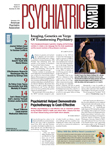Federal mental health leaders have a message for psychiatrists: Give “recovery” another look.
That is, psychiatrists and mental health professionals should move from an approach that emphasizes recommending disease treatments to one that focuses on asking patients what they want from treatment and discussing ways to meet those goals.
Leaders from the Substance Abuse and Mental Health Services Administration (SAMHSA) met with about 40 psychiatrists in October to discuss ways to move psychiatry into the “recovery-focused” movement long espoused by patient-advocacy groups. A big focus of the meeting in Washington, D.C., on October 5 and 6 was on developing explicit clinical instructions on the use of “recovery” approaches and ways to promote those strategies to psychiatrists.
Kenneth Thompson, M.D., associate director for medical affairs at SAMHSA's Center for Mental Health Services, helped organize the event and shared some of his clinical experiences using a recovery-based approach. Such approaches have made many of his patients “more engaged” in their treatment and produced better overall outcomes, he said.
“I find practice more fulfilling and less deadening,” said Thompson in an interview with Psychiatric News.
Recovery has been used to denote amelioration of symptoms along with a reduction of the impact of serious mental illness on patients' lives. Patient advocates emphasize an understanding of recovery that focuses less on a remission of symptoms and more on helping patients overcome the effects of mental illness on their lives, including difficulties with employment, housing, and a lack of hope about their future.
A shift of emphasis to a recovery approach “creates tension with a system created to treat people's illnesses,” Wayne Katon, M.D., a professor and vice chair of psychiatry at the University of Washington, told Psychiatric News. “There are things that we have to learn from that perspective that have been ignored by the national mental health professions.”
Urged by Presidential Commission
The recovery approach has a long history in general health care and has been widely used by many who provide care for people with psychiatric illness. The New Freedom Commission on Mental Health endorsed the recovery approach when it called for a “fundamental transformation of the nation's approach to mental health care” in its report to President George W. Bush in July 2003. The commission recommended a focus on “promoting recovery and building resilience.”
A 2005 APA position statement titled “Use of the Concept of Recovery” described the recovery approach as one that “enriches and supports medical and rehabilitation models.”
“By applying the concept of recovery as well as rehabilitation techniques and by encouraging other mental health professionals to adopt the concept of recovery, psychiatrists can enhance the care of all clinical populations served within the community-based and other public-sector mental health and behavioral health systems,” said the statement.
The SAMHSA meeting “signaled to me that the issue of recovery is beginning to be seriously considered,” said Annelle Primm, M.D., M.P.H., director of the APA Office of Minority and National Affairs.
Specific Help Planned
The challenge to implementing wide adoption by psychiatrists of a recovery model may come in the transition from concept to practice.
The SAMHSA effort aims to move beyond previous educational efforts about recovery to create specific instructions, possibly by next spring, that psychiatrists can use as guidelines for integrating recovery models into their practices. Such training materials are needed in the same way that training is required to perform mental status exams and cognitive-behavioral therapy, said Joseph Parks, M.D., director of the Division of Comprehensive Psychiatric Services at Missouri's Department of Mental Health, in an interview with Psychiatric News.
“If we're going to learn to do a recovery-oriented interaction with patients, it's going to be that same kind of very explicit instruction and feedback to us as individuals,” Parks said. “We'll never get there by [recovery] just being a general philosophy.”
Recovery-orientation training should include the types of questions psychiatrists need to ask certain patients and even how to ask those questions, he said.
The recovery approach is one in which many community psychiatrists have recently expressed great interest, Parks said. The biggest challenge to implementing the change in approach will be the development of more explicit training and broad commitments from psychiatrists to complete the training.
“Most of us now are familiar with doing motivation enhancement-type of interviews and a brief medication check in 15 minutes; it's hard to pack it in, but we know how to do that,” Parks said. “And we can get the same way with the recovery-oriented interaction. We just need that level of explicit instruction.”
Payment structures are unlikely to prevent a move toward broader adoption of a recovery model in psychiatric care, Parks suggested.
“We can do more recovery-oriented things even during the medication visit; we can certainly do it during medical psychotherapy—a therapy visit that includes a medication element,” he said. Payers “don't really constrain exactly how we interact with the person in the room; they just list a few elements that we need to get through. But most of the interaction we can do what we will with.”
The specifics of those approaches should become clear through the SAMHSA-led effort to provide “explicit, actionable instructions” for psychiatrists, he said.

